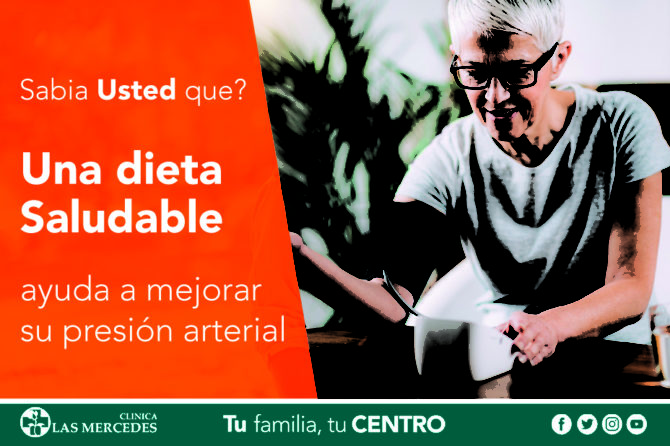
Foods to regulate blood pressure
Hypertension increases the risk of cardiovascular or brain disease. These foods provide potassium or antioxidants that reduce artery tension.
Hypertension, or high blood pressure, is increasingly common in developed countries and a major risk factor for cardiovascular disease or stroke.
Because tension is the force that blood exerts against the walls of your arteries when your heart pumps it, the factors that influence are many. At Clinica Las Mercedes we have several services that can help with these symptoms.
Hypertension may occur:
- By increased blood volume, due to renal impairment and poor regulation of sodium, although the liver and spleen are also involved in blood volume levels;
- Poor condition of the arteries or calcium buildup in the walls;
- By alteration of vasodilation and vasoconstriction due to stress, stimulants or poor diet.
What foods to avoid and which to boost
Foods to avoid include sugars, alcohol, liquorice, spicy, sodium and the products that contain it (sausages, cheeses, preserves, etc.).
It replaces salt with moderate amounts of seaweed, tamarind or miso and sea water, or spices (not spicy), aromatic herbs and garlic.
In addition to avoiding some foods, we should also increase the intake of other foods that promote blood pressure control:
Potassium-rich foods, as potassium compensates for the effect of sodium on the distribution of bodily fluids
Foods rich in phytochemical compounds that dilate the arteries.
Here are some of the highlights. Be sure to regularly include them in your diet:
- Garlic, with vasodilator effect
Garlic is one of the foods with the most therapeutic properties. It helps purify the blood and is antibacterial and antifungal.
In the case of hypertension, it acts as a vasodilator of the capillaries and arteries.
Be sure to take at least 1 tooth a day, raw or cooked, in sauces, sautéed or creams.
- Onion, essential every day
Onion has garlic-like properties. It promotes the dilation of blood vessels and good circulation. It is essential to incorporate it into the diet daily.
Eat 1 onion a day, raw or cooked. If consumed raw, better marinated with apple cider vinegar.
- Extra virgin olive oil, accompanying vegetables and salads
Olive oil is very rich in antioxidants, such as vitamin E. Excess free radicals are known to inactivate nitric oxide, a substance with vasodilator effects.\
Season vegetables and salads with 3-4 tablespoons a day of extra virgin olive oil.
- Legumes, 4 or 5 times a week
They are regulatory foods at different levels, as they provide a lot of fiber, proteins, vitamins and minerals.
Take legumes 4-5 times a week in the form of hummus, salads, stews or soups.
- Cinnamon to control blood sugar
Cinnamon helps control blood sugar levels. High blood glucose causes an inflammatory state that affects the malfunction of the vascular and circulatory system.
Each day add a pinch to any dish, such as fruit compotes.
- Purifying and diuretic celery
Celery promotes the removal of sodium by urine and helps decrease the volume of blood in the arteries.
Eat 4 stalks a day in fruit juices, vegetable juices, salads, creams or cooked.
From: cuerpomente.com
Leave a reply


Hypertension in a pregnant women are very dangerous, both for them and their fetus as well. I am thankful that you shared such an wonderful post on hypertension.
ReplyHerbal treatment is 100% guaranteed for HSV cure and other drug resistance infections, the reason why most people find it difficult to cure HSV 1 or 2 is because they believe in medical reports, drugs and medical treatments which are not helpful to cure HSV and haven’t proved any sign of helping. Natural roots/herbs are the best remedy which can easily eradicate herpes forever. I never believed it until I was helped and cured of my 3 years genital herpes with natural herbal medicines from Dr Okosun. Where other medical prescribed drugs and treatments failed, Dr Okosun natural herbs helped save me from Genital herpes permanently and I’m so grateful for this. You can also get help from this great and powerful African Herbalist Dr Okosun by reaching him via his email: drokosun55@gmail.com
Replyor WhatsApp +2348124363791
God bless you all.
Monitoring blood pressure is really important that everyone should consider.
ReplyHOW I GOT RID OF HERPES SIMPLEX VIRUS BY DR VOODOO
I want to inform the public how I was cured of herpes simplex Virus by a herbal Dr called VOODOO. I visited different hospitals but they gave me a list of drugs like Famvir, Zovirax, and Valtrex which are very expensive to treat the symptoms and never cured me. I was browsing through the Internet searching for remedies on Herpes and I saw comments of people talking about how dr VOODOO cured them. I Was scared because I never believed in the Internet but I was convinced to give him a try because I had no hope of being cured of herpes so I decided to contact him on his email, i searched his email on the net and I saw a lot of people testifying about his goodness. When I contacted him he gave me hope and sent a Herbal medicine to me that I took and it seriously worked for me, am a free person now without any problems, my HERPES result came out negative. You can contact him on his what – sapp via +2348140120719 or email voodoospelltemple66@gmail.com and get all your problems solved.
ReplyI contacted herpes’ I was told there is no herpes cure except treatment to
Replycontrol it. I totally lost hope. All I could think was losing my life it
was so embarrassing to have this virus, few weeks ago I ready about a
possible natural herbs cure which was guaranteed. And I ordered the natural
herbs treatment from Dr voodoo after some weeks I got 100? cure. Now I’m so
excited to share this testimony contact Dr voodoo WhatsApp number
+2348140120719 also e-mail him at: voodoospelltemple66@gmail.com